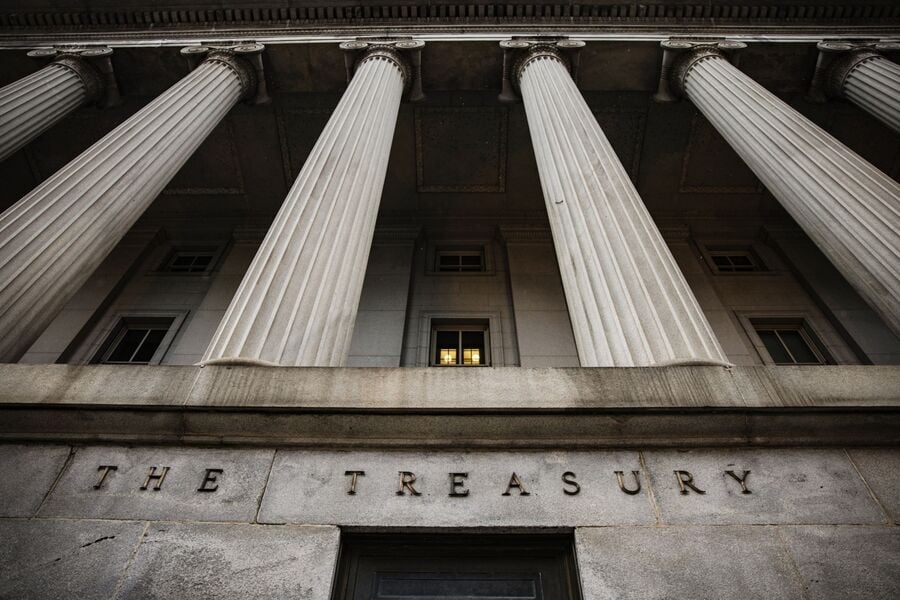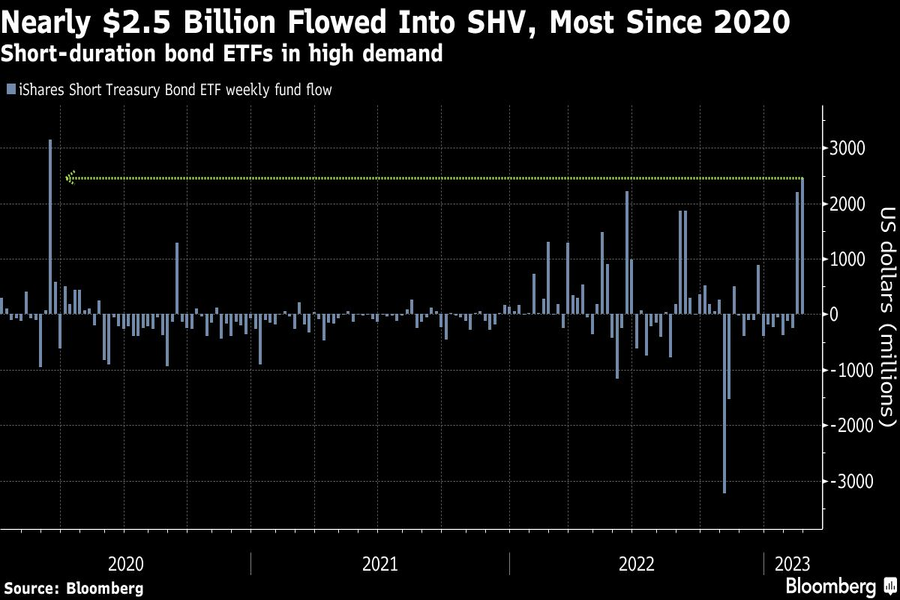

Turbulent equity markets and lofty bond yields has cash back in high demand.
Nearly $2.5 billion flooded into the $23 billion iShares Short Treasury Bond ETF (SHV) last week, according to data compiled by Bloomberg. That’s the biggest weekly influx for SHV, which holds bonds maturing in one year or less, since the depths of the pandemic in March 2020.
With yields on short-dated Treasury bills hovering near multidecade highs, cash is enticing investors once again after record demand in 2022. Stubbornly high inflation and the Federal Reserve’s resolve to squash it has fueled a repricing of interest-rate hike expectations in recent weeks, roiling stocks and bonds alike. The haven appeal of cash-like positions combined with reliable returns means investors have an attractive place to wait out the volatility, according to Citi Global Wealth Management’s Kristen Bitterly.
“The number one question that we get, especially once that six-month T-bill crossed over that 5% threshold, is why wouldn’t I sit this out and hang out in T-bills?” Bitterly, head of North America investments at Citi, said in a Bloomberg Television interview on Friday. “We don’t think there’s really any need to stretch in terms of yield. You don’t have to go into high yield, you can certainly take advantage of those short-duration T-bills.”

Cash-like ETFs were a hot item across the board last week as the S&P 500 delivered its worst performance of 2023. While SHV’s haul was the most of any fund, that was followed by a $1.8 billion inflow into the $26 billion SPDR Bloomberg 1-3 Month T-Bill ETF (BIL) and a record $1.2 billion into the $8 billion iShares 0-3 Month Treasury Bond ETF (SGOV).
Six-month Treasury bills currently yield about 5%, the highest since 2007, compared to the S&P 500’s earnings yield of roughly 5.3%. That’s the slimmest advantage for stocks since 2001. Meanwhile, the average yield on US investment-grade bonds currently stands at about 5.5% — close to the smallest gap on record for the two asset classes.
“I don’t think, given the strength of the growth data, that the inflation upside surprises will diminish soon,” said Peter Chatwell, head of global macro strategies trading at Mizuho International. “The risk of further hawkish rates repricings will make the short end of the curve look even more attractive as an income generating safe haven.”

A Texas-based bank selects Raymond James for a $605 million program, while an OSJ with Osaic lures a storied institution in Ohio from LPL.

The Treasury Secretary's suggestion that Trump Savings Accounts could be used as a "backdoor" drew sharp criticisms from AARP and Democratic lawmakers.

Changes in legislation or additional laws historically have created opportunities for the alternative investment marketplace to expand.

Wealth managers highlight strategies for clients trying to retire before 65 without running out of money.

Shares of the online brokerage jumped as it reported a surge in trading, counting crypto transactions, though analysts remained largely unmoved.
Orion's Tom Wilson on delivering coordinated, high-touch service in a world where returns alone no longer set you apart.
Barely a decade old, registered index-linked annuities have quickly surged in popularity, thanks to their unique blend of protection and growth potential—an appealing option for investors looking to chart a steadier course through today's choppy market waters, says Myles Lambert, Brighthouse Financial.
